GitHub Advanced Security (GHAS) is GitHub’s add-on security suite that brings code scanning (SAST), secret detection, and supply chain insights into your repositories. It’s commonly used by teams on GitHub Enterprise to catch vulnerabilities in code, prevent leaked secrets, and enforce dependency security. However, many organizations are now exploring alternatives due to its complex setup, noisy results, and steep pricing.
GHAS often overwhelms developers with alerts and false positives, and is only available as a paid add-on for Enterprise accounts. In practice, what should be a helpful safety net can turn into a source of friction and fatigue. Here’s what some of its users have to say:



Users also shared:
“After leaving one of the legacy players, we did a full sprint and found GHAS to be underwhelming on a few fronts...” – Reddit user (r/cybersecurity)
For many teams, the pain points include alert fatigue (too many low-value findings and false positives), limited coverage (only code hosted on GitHub repos, no cloud or containers), enterprise-only pricing, and its lack of a developer-first experience. If these sound familiar, it might be time to look at alternatives that better fit your needs.
TL;DR
Aikido Security stands out as the #1 GitHub Advanced alternative, providing security solutions with a modern developer-first experience. It stands out first and foremost because it is built with the end-user in mind; meaning better developer experience and a more innovative product roadmap. In the backend, GitHub uses a SAST engine that is version sensitive because it needs to compile the code. Aikido, on the other hand, uses OpenGrep, which is an engine that does not need to compile. The result? For large monorepos, the scanner won’t time out like it does for GitHub AS, and for all repos, Aikido stands out for performance and quality of findings.
Secondly, for users that want more security coverage, Aikido offers far more: DAST & API security, runtime protection, IaC, reachability analysis, cloud security (CSPM), AI penetration testing, and an in-app firewall. These features are best-in-class as standalone solutions, can be integrated on a modular basis, or can be provided as a complete security platform, depending on your organization’s needs. To benefit from all the capabilities that Aikido offers, GitHub Security sers would have to leverage multiple tools such as GitHub Secrets Protection, GitHub Code Security, Stackhawk, and more.
Also, it ties into your pipelines and IDEs to scan code, dependencies, containers, IaC – you name it – in the background, then uses AI triage to kill ~85% of the noise.Numerous organizations have ripped and replaced GitHub Advanced Security with Aikido Security.
Comparison Between GitHub Advanced Security and Aikido
If you’re ready, here are our top GitHub Advanced alternatives: :
- Aikido Security – Developer-first, code-to-cloudAppSec platform
- Bearer – Privacy-aware SAST with compliance focus
- Checkmarx One – Enterprise-grade unified AppSec
- SonarQube/SonarCloud – Code quality platform with built-in SAST
- SpectralOps – Lightweight, fast CLI-based scanning
Exploring top security tools beyond GitHub-native options? Check out our Top AppSec Tools in 2026 for a curated guide on the top application security solutions teams are using today.
What Is GitHub Advanced Security?
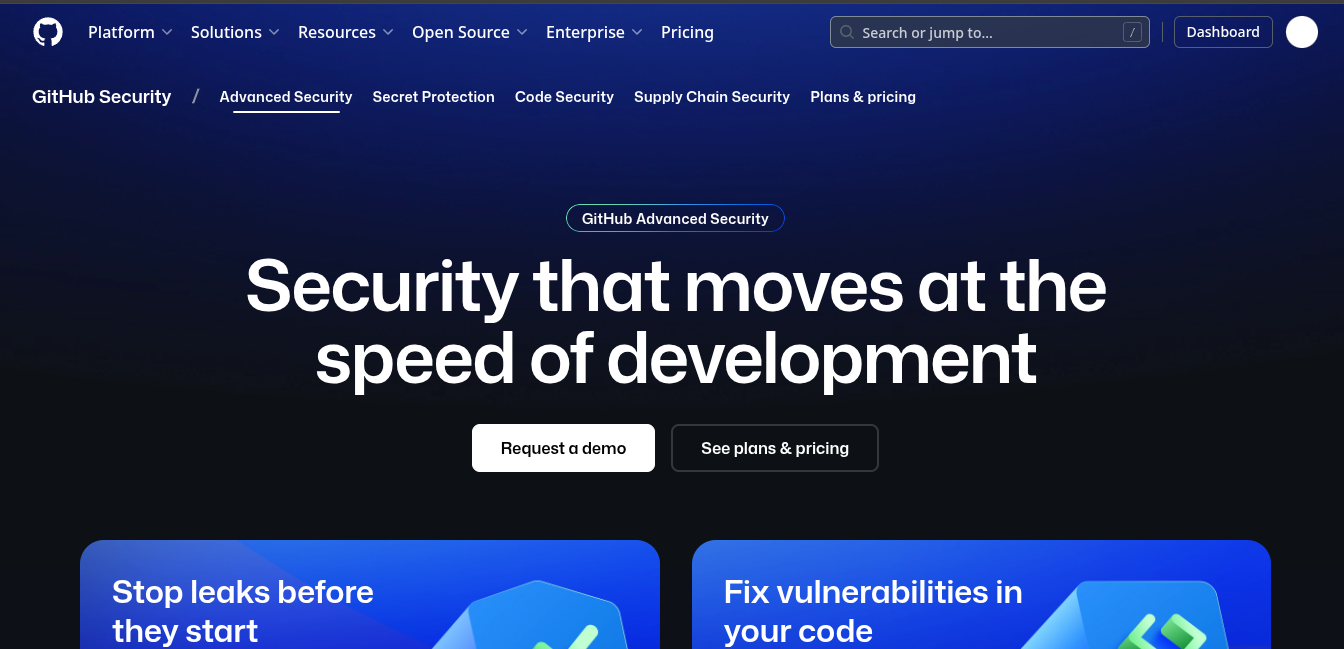
GitHub Advanced Security is a suite of features built into GitHub’s Enterprise tier, for application security. It includes:
- Code Scanning (SAST): Scans code using CodeQL to detect common vulnerabilities like XSS or SQL injection.
- Secret Scanning & Push Protection: Finds and blocks exposed API keys or credentials in git history or real-time pushes.
- Dependency Security: Helps secure your open-source dependencies using Dependabot.
- GitHub Workflow Integration: Results show up in PRs and the Security tab.
Why Look for Alternatives?
Even with GitHub’s backing, GitHub Advanced Security has its limits:
- High False Positives: Developers often struggle with triaging low-value findings.
- Limited Coverage Scope: GHAS doesn’t cover IaC, container scanning, cloud security, or cloud posture management – key areas now addressed by tools like Aikido Security
- Enterprise Pricing & Access: It’s only available on GitHub Enterprise, and its pricing can be steep when scaling .
- Developer Experience Issues: Configuration is cumbersome compared to dev-first platforms like Aikido’s CI/CD security.
- Policy and Integration Gaps: Lacks the advanced customization or integrations many teams now expect.
Key Criteria for Choosing an Alternative
When looking for GitHub Advanced alternatives, here’s what to prioritize:
- Coverage: Tools like Aikido offer scanning across code, open source, IaC, secrets, and cloud configs.
- Developer Experience: Look for tools that offer AI autofix, PR comments, and IDE feedback.
- Low Noise: Prioritize tools with reachability analysis and customizable rule sets.
- Speed: No one wants scans that take forever. Look for tools that are fast and perform incremental scans.
- Transparency: Avoid black-box tools. Tools that offer open policies, custom rules, and visibility in results build trust.
Top 5 Alternatives to GitHub Advanced Security in 2026
Each of the tools below addresses GHAS’s shortcomings in different ways. Below we break down their core features along with everything you need to know before choosing an alternative.
1. Aikido Security
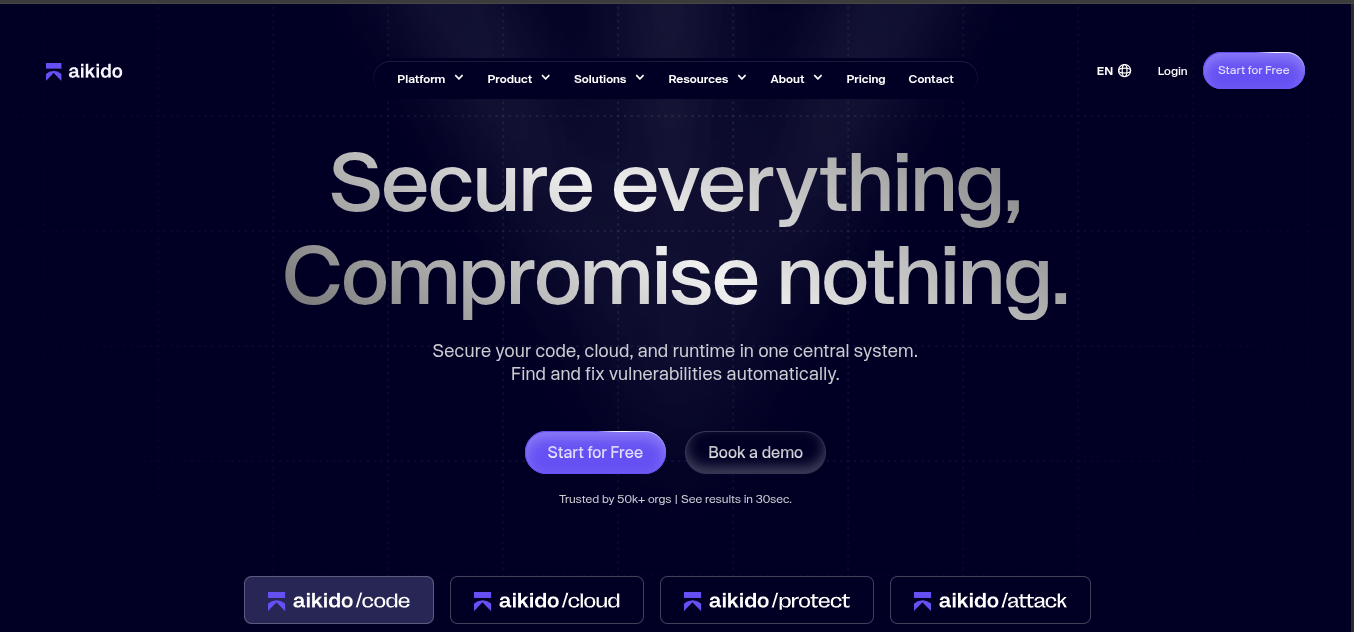
Aikido Security is a modern, developer-first application security platform which provides the best-in-class capabilities as standalone alternatives to GHAS, or as one suite covering everything. It offers static code analysis (SAST), open-source dependency scanning (SCA), secret detection, IaC scanning, cloud security, container image scanning, DAST, and more.
Unlike GHAS, which is tied to GitHub, Aikido is platform agnostic with support for multiple code hosts as well as integrating into CI/CD pipelines, IDEs, and issue trackers.
Key Features:
- Beast-of-Breed Scanners: Aikido offers the best-in-class scanners for your IT landscape including, SAST, SCA, secrets, IaC, containers, and cloud configs etc. when compared with other scanners No patchwork needed.
- Developer-Centric Workflow: Instant feedback in PRs and IDEs, plus AI-powered autofix and actionable remediation workflows.
- Low Noise, High Signal: Uses reachability analysis and curated rules to surface what matters. Cutting false positives by up to 85%.
- Built for Devs: – Integrates deeply with GitHub, GitLab, Bitbucket, Jira, Slack, and much. You can run scans locally, in pull requests, or as part of your release process.
- Fast, Continuous Feedback: Scans run in minutes, not hours.
- Connected “code-to-cloud” coverage: Aikido links code, cloud, and runtime in one seamless workflow. You can start with the module for (code scanning, container/IaC scanning, API security, and runtime protection) and scale to gain deeper context as you expand.
Why Choose It:
Pick Aikido if you want a GHAS alternative that’s truly developer-first and goes far beyond code. It's the best choice for fast-moving teams looking for a single suite that covers everything, as well as enterprises looking for specific tools that solve their security pain points ,with minimal friction, and zero enterprise lock-in.
Pros:
- Flat-rate plans make budgeting simple and predictable.
- Cross-platform support (GitHub, GitLab, Bitbucket, Jenkins etc.)
- Provides context-aware remediation guidance and risk scoring
- Auto-fix functionality for common issues and dependencies
- Broad language support
- Advanced filtering reduces false positives, making alerts actionable.
Hosting Model:
- Saas (Software-as-a-service)
- On-Premise
Target Users:
- Startups and small-to-medium teams seeking an one suite, everything covered application security platform
- Enterprises looking to address specific security pain points
Pricing:
- Free: $0 (2 users, full scanner suite, 10 repos)
- Basic: $350/month (ideal for small teams, 10+ users, 100 repos)
- Pro: $700/month (growing teams, custom rules, 20 million reqs/month)
- Advanced: $1050 (enterprise feature set)
Custom offerings are also available for startups (30% discount) and enterprises
Gartner Rating: 4.9/5.0
Aikido Security Reviews:
Beyond Gartner, Aikido Security also has a rating of 4.7/5 on Capterra, Getapp and SourceForge
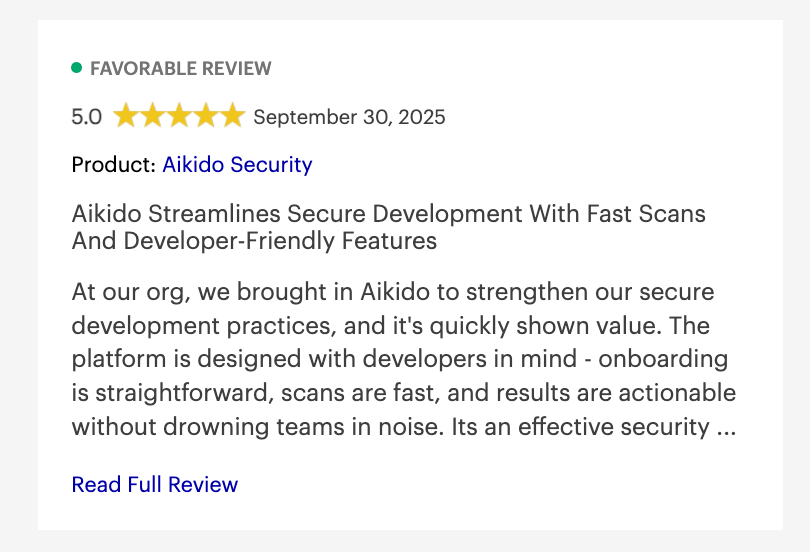
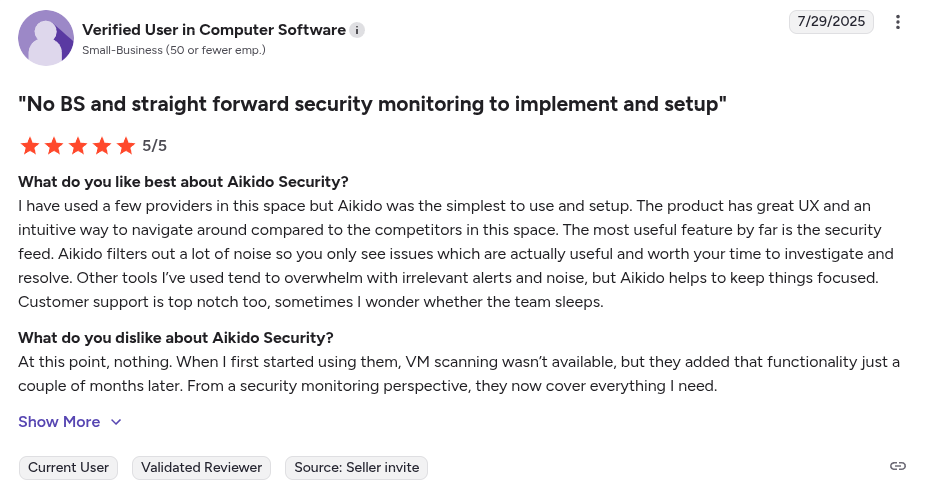
2. Bearer
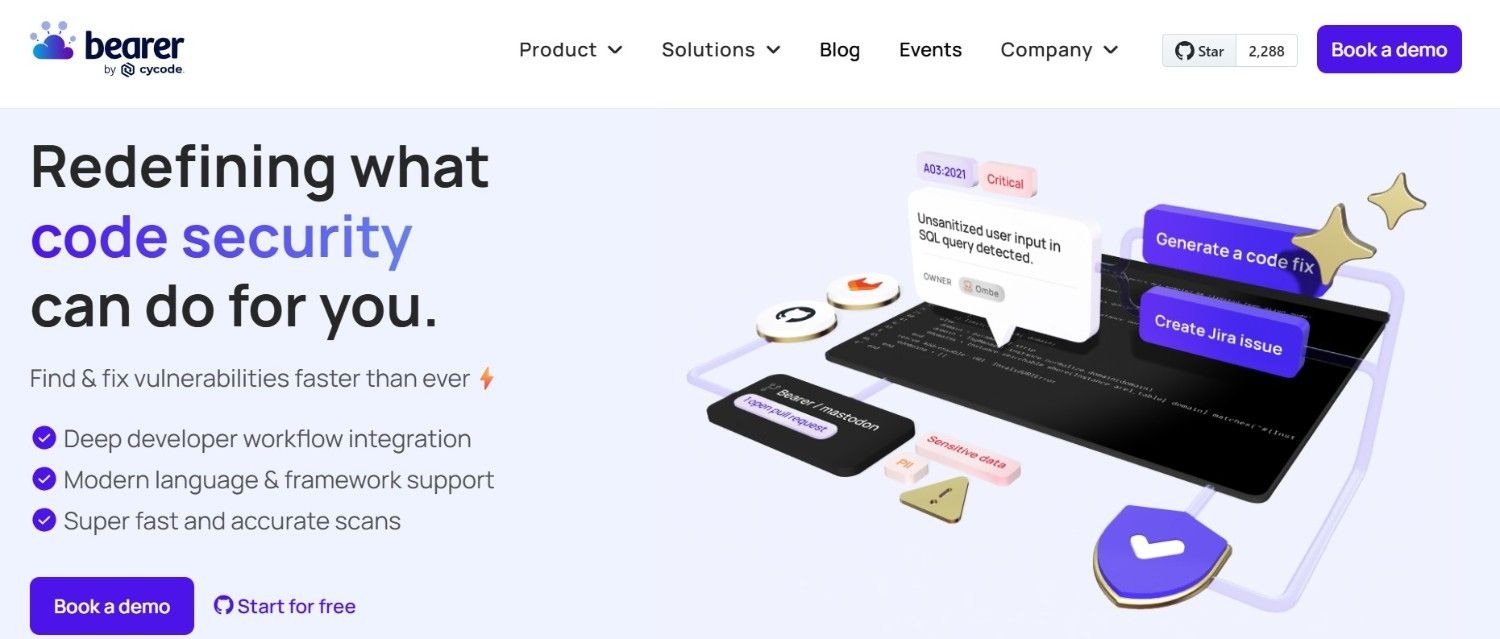
Bearer is a static analysis tool focused on data security and privacy. Unlike GHAS, Bearer identifies not just code vulnerabilities but also where sensitive data (like PII, PHI, and PCI) flows through your app. Built with privacy regulations like GDPR and HIPAA in mind, Bearer is a good choice for teams prioritizing security + compliance .
Their CLI tool is open source, fast, and built for developer workflows.
Key Features:
- Sensitive Data Tracing: Detects personal data (emails, user IDs, health records) and tracks where it’s stored or transmitted.
- OWASP + Privacy Rules: Combines traditional OWASP Top 10 style security checks with privacy-specific logic.
- Developer & Compliance Friendly: Offers CI integration, GitHub/GitLab PR feedback, and privacy reports that map directly to compliance frameworks.
Why Choose It:
Use Bearer when your team handles sensitive data and wants early visibility into privacy risks, not just security flaws. Its open-source CLI makes it ideal for lean teams that want built-in compliance.
Pros:
- Automatically detects sensitive data flows (PII, credentials)
- Developer-friendly workflow
- AI-powered remediation
Cons:
- Primarily enterprise focused
- Limited scope beyond API and data security
- Weaker automation and remediation support
- Requires pairing with other tools for full AppSec coverage
- Steep learning curve for new users
Hosting Model:
- Saas (Software-as-a-service)
- On-Premise
- Hybrid
Target Users:
Mid-to-large enterprises.
Pricing:
Custom pricing
Gartner Rating: 4.5/5.0
Bearer Reviews:
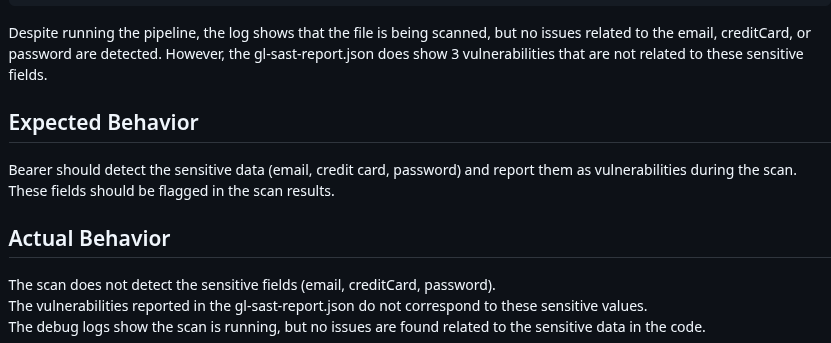
3. Checkmarx One
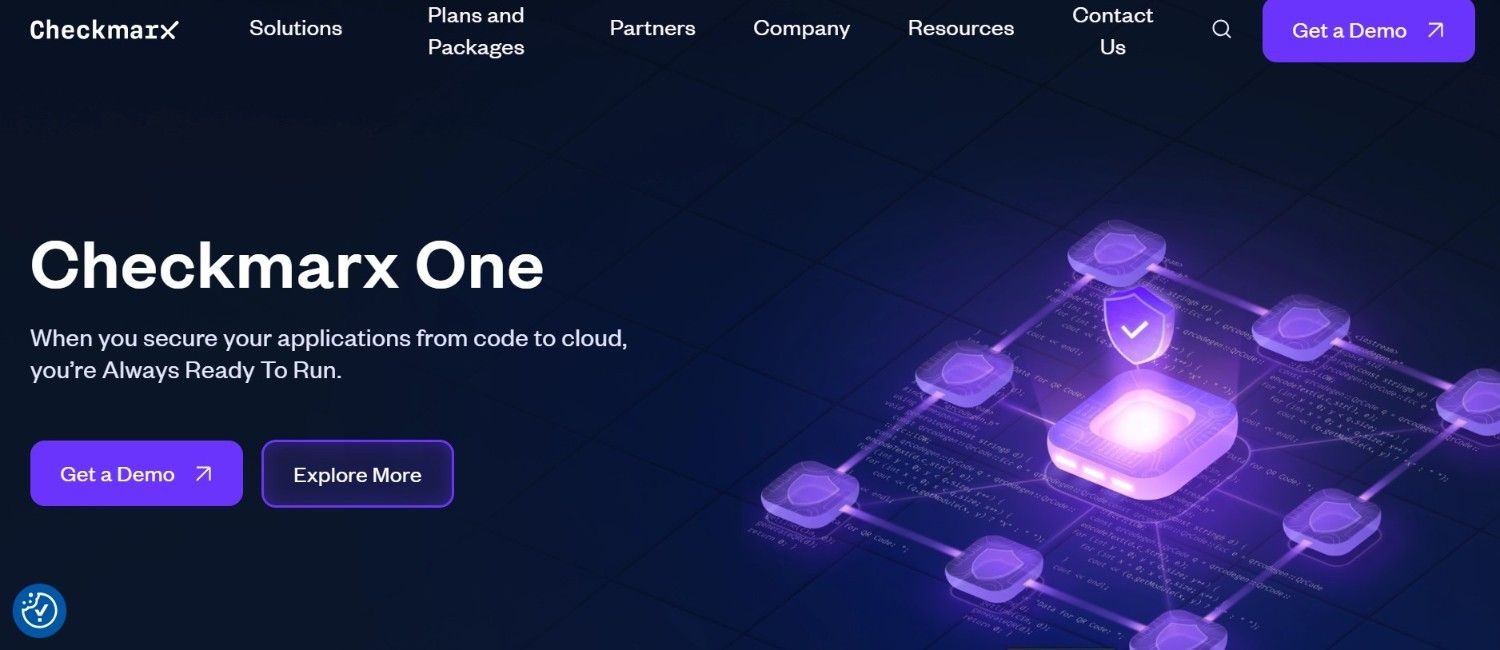
Checkmarx One is an enterprise-grade application security platform with a primary focus on SAST. It unifies static code scanning, software composition analysis, container security, and infrastructure-as-code (IaC) scanning into a single unified interface. Unlike GHAS, it works across multiple repos and cloud providers, with rich security policy controls.
Key Features:
- Unified AppSec Platform: Combines SAST, SCA, container/IaC scanning, and orchestration in one place.
- Enterprise Policy Engine: Fine-grained risk scoring, custom rules, and integrations for compliance (e.g. SOC 2).
- IDE & CI Integrations: Full support for VS Code, IntelliJ, Jenkins, GitHub Actions, and more.
Why Choose It:
If you're at scale or in a regulated space, Checkmarx is a good option. You get enterprise-ready enforcement and coverage that GHAS lacks, including custom rule logic and broader scan targets. However, be ready to invest time and budget as it's not a lightweight solution.
Pros:
- Broad language and framework coverage
- Strong SAST engine with deep analysis
- Enterprise-ready compliance and reporting
- Robust security research and threat intel
Cons:
- Limited agility for smaller dev teams
- Primarily enterprise focused
- Heavier administration for CI/CD pipelines
- Separate pricing for each security module
Hosting Model:
- Saas (Software-as-a-service)
- On-premise
Target Users:
Enterprises
Pricing:
Custom pricing
Gartner Rating: 4.6/5.0
Checkmarx One Reviews:
Capterra Checkmarx One a 3.9/5, based on over 50 reviews.
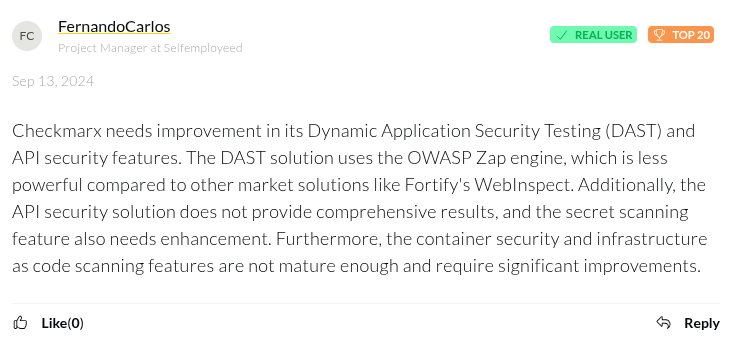
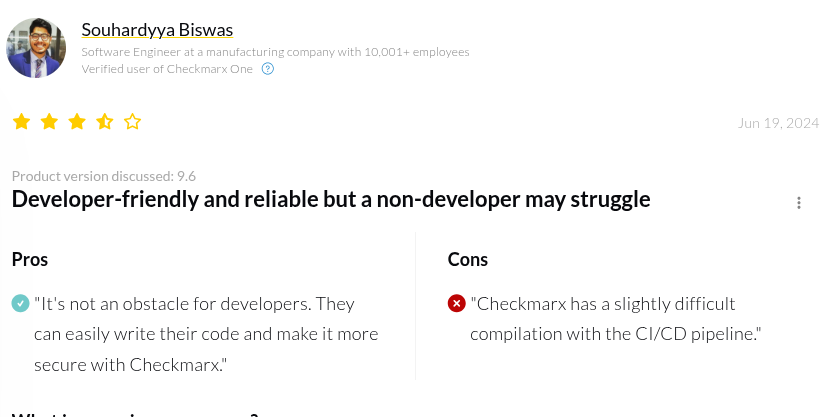
4.SonarQube / SonarCloud
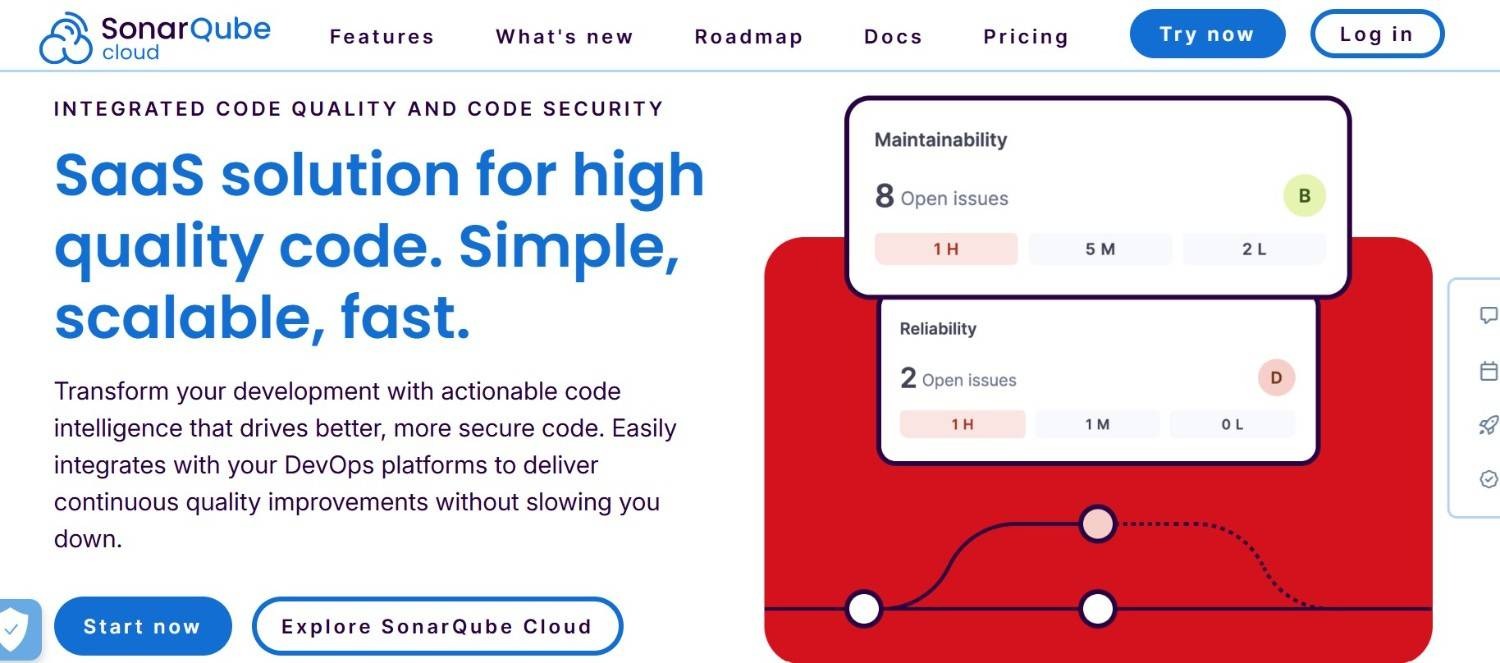
SonarQube and SonarCloud are trusted tools for code quality and security inspection. While traditionally focused on bugs and maintainability, their SAST coverage has grown and now includes OWASP Top 10 rules.
GitHub Advanced users often switch to Sonar for a cleaner, more integrated code review experience.
Key Features:
- Code Quality + Security: Static code analysis across 30+ languages, including taint analysis for vulnerabilities.
- PR & CI Integration: Works with GitHub Actions, Bitbucket Pipelines, and Azure DevOps. Quality gates help enforce standards at every PR.
- Developer-First UX: Combines with SonarLint for in-IDE issue flagging, backed by clear fix guidance and quality dashboards.
Why Choose It:
Sonar is perfect for teams focused on code health and secure coding practices. It integrates well into PR reviews—plus, it catches a lot without overwhelming your team.However, It doesn’t cover your cloud and IaC workflows like developer-first platforms such as Aikido’s security, but as a code-focused tool, it’s more than suitable.
Pros:
- Developer-friendly feedback in real-time.
- Provides code quality checks and security scanning in one tool.
- Integrates seamlessly with common DevOps platforms
- Free community edition
Cons:
- Pricing based on “Lines of Code (LOC)” can become expensive
- Increased false positives for certain codebases
- Limits on automatic analysis
- Limited coverage for containers, runtime, cloud, IaC and security posture
Hosting Model:
- Saas (Software-as-a-service)
- On-premise
Target Users:
- Small and medium-sized businesses (SMBs)
- Enterprises
Pricing:
SonarQube’s pricing comes in two categories: cloud-based and self-managed.
Gartner Rating: 4.4/5.0
SonarQube/SonarCloud Reviews:

5. SpectralOps

SpectralOps is a fast, developer-friendly CLI scanner known for its secret detection and configuration linting. Now part of Check Point, it’s still available as a standalone tool and popular for lightweight security that fits directly into CI/CD workflows. Think of it as GHAS’s secret scanning—only faster and repo-agnostic.
Key Features:
- Credential & Token Detection: Detects over 50 types of hardcoded secrets (AWS keys, API tokens, SSH keys etc.)
- IaC & Config Linting: Flags misconfigured permissions, exposed cloud settings, and common mistakes in Terraform, CloudFormation, and more.
- Fast, Offline CLI: Single-binary, with local scan that runs anywhere
Why Choose It:
Spectral is your go-to if you need a quick win on secrets and IaC scanning. Devs love it because it’s drop-in fast and doesn’t require cloud onboarding. Pair it with a more comprehensive tool like Aikido Security if you want deep SAST and full cloud coverage.
Pros:
- Strong secrets detection feature
- Supports integration with common CI/CD platforms
- Supports custom policies
Cons:
- Limited scope beyond Iac configuration and secrets scanning
- Requires pairing with other platforms for full AppSec coverage
- False positives
- Enterprise features vary by offering
Hosting Model:
Hybrid
Target Users:
- Small and medium-sized businesses (SMBs)
- Enterprises
Pricing:
- Free
- Business: $475/month (ideal for small teams, 10+ users, 100 repos)
- Enterprise: Custom pricing
Capterra Rating: 4.6/5.0
Comparing GitHub Advanced Alternatives
To help you compare the capabilities of the alternatives above, the table below summarizes each platform's coverage across key areas.
Conclusion
GitHub Advanced Security gets the basics right,but for many teams, it’s noisy, limited, and locked behind enterprise pricing. The good news? You’ve got better options.
Whether you need broader coverage, cleaner dev experience, or just want to ship secure code without the fluff, tools like Aikido Security gets you there by providing the best-in-class solutions either as individual services or one suite with everything covered.
Want less noise and more real protection?Start your free trial or book a demo with Aikido today.
FAQ
You Might Also Like:

Secure your software now
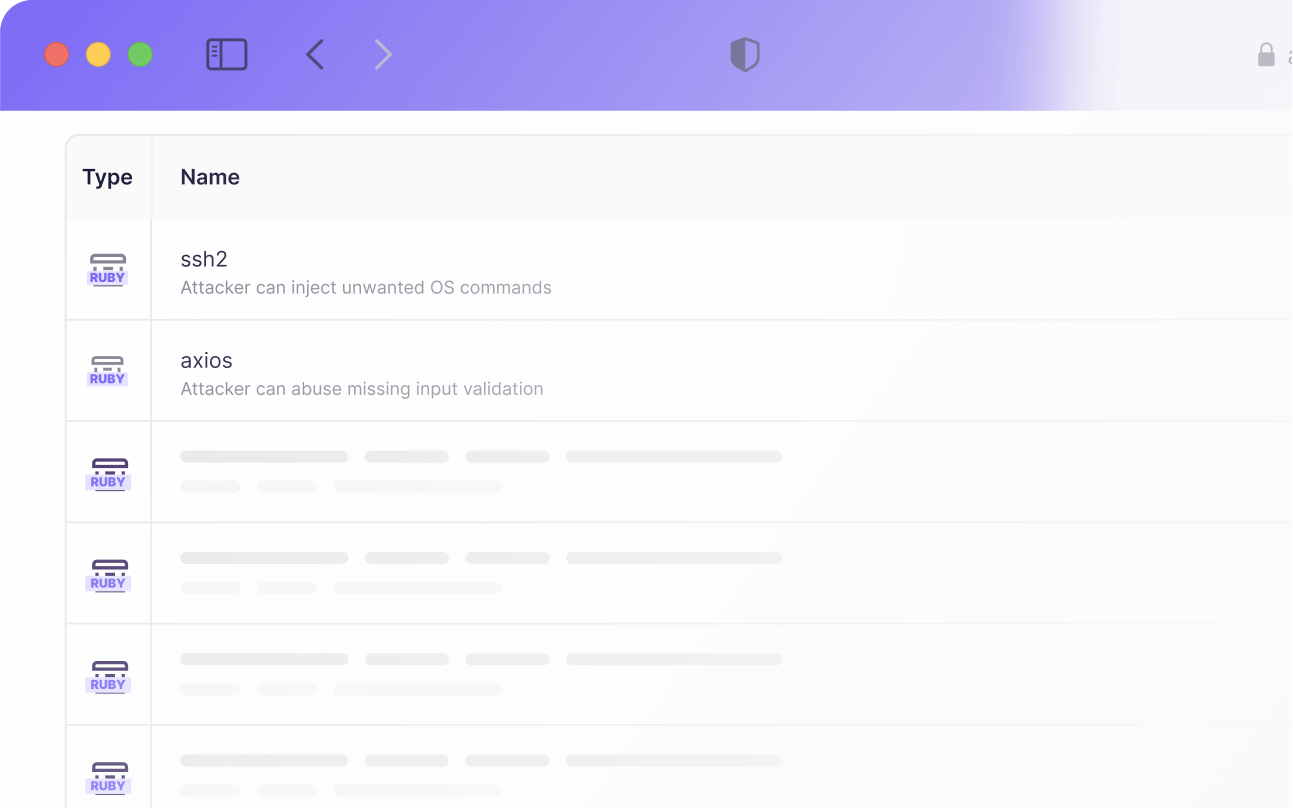
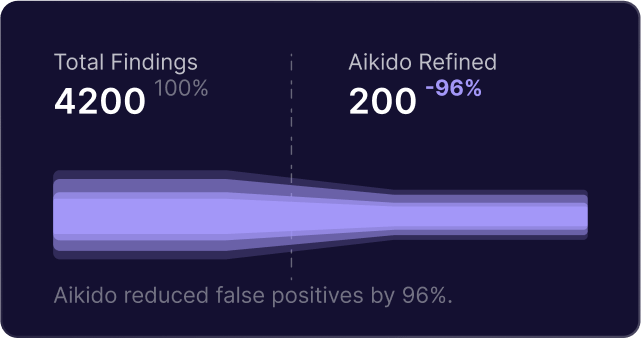



.avif)
